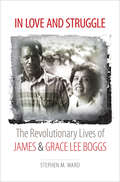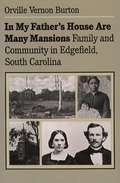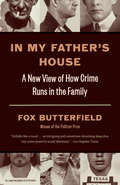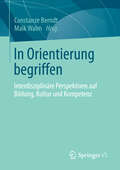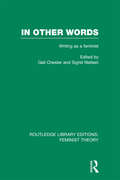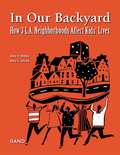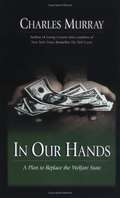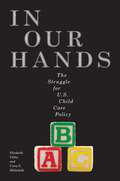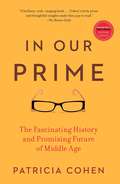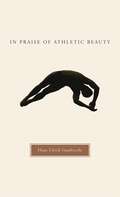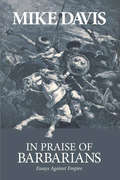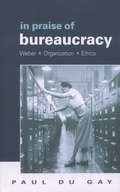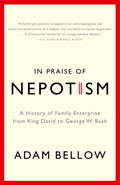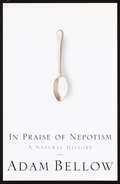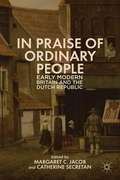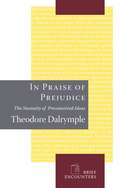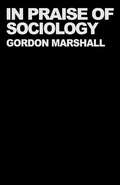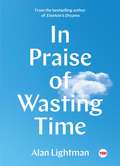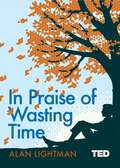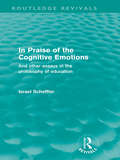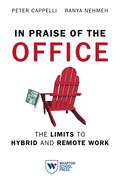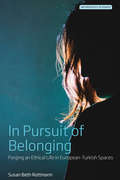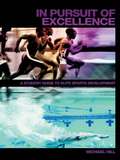- Table View
- List View
In Love and Struggle: The Revolutionary Lives of James and Grace Lee Boggs (Justice, Power, and Politics)
by Stephen M. WardJames Boggs (1919-1993) and Grace Lee Boggs (1915-2015) were two largely unsung but critically important figures in the black freedom struggle. Born and raised in Alabama, James Boggs came to Detroit during the Great Migration, becoming an automobile worker and a union activist. Grace Lee was a Chinese American scholar who studied Hegel, worked with Caribbean political theorist C. L. R. James, and moved to Detroit to work toward a new American revolution. As husband and wife, the couple was influential in the early stages of what would become the Black Power movement, laying the intellectual foundation for racial and urban struggles during one of the most active social movement periods in recent U.S. history. Stephen Ward details both the personal and the political dimensions of the Boggses' lives, highlighting the vital contributions these two figures made to black activist thinking. At once a dual biography of two crucial figures and a vivid portrait of Detroit as a center of activism, Ward's book restores the Boggses, and the intellectual strain of black radicalism they shaped, to their rightful place in postwar American history.
In My Father's House Are Many Mansions
by Orville Vernon BurtonBurton traces the evolution of Edgefield County from the antebellum period through Reconstruction and beyond. From amassed information on every household in this large rural community, he tests the many generalizations about southern black and white families of this period and finds that they were strikingly similar. Wealth, rather than race or class, was the main factor that influenced family structure, and the matriarchal family was but a myth.
In My Father's House: A New View of How Crime Runs in the Family
by Fox ButterfieldFrom the Pulitzer Prize-winning New York Times journalist: a pathbreaking examination of our huge crime and incarceration problem that looks at the influence of the family--specifically one Oregon family with a generations-long legacy of lawlessness. <P><P>The United States currently holds the distinction of housing nearly one-quarter of the world's prison population. But our reliance on mass incarceration, Fox Butterfield argues, misses the intractable reality: As few as 5 percent of families account for half of all crime, and only 10 percent account for two-thirds. In introducing us to the Bogle family, the author invites us to understand crime in this eye-opening new light. He chronicles the malignant legacy of criminality passed from parents to children, grandchildren, and even great-grandchildren. <P><P>Examining the long history of the Bogles, a white family, Butterfield offers a revelatory look at criminality that forces us to disentangle race from our ideas about crime and, in doing so, strikes at the heart of our deepest stereotypes. And he makes clear how these new insights are leading to fundamentally different efforts at reform. <P><P>With his empathic insight and profound knowledge of criminology, Butterfield offers us both the indelible tale of one family's transgressions and tribulations, and an entirely new way to understand crime in America.
In Orientierung begriffen
by Constanze Berndt Maik WalmBildung, Kultur und Kompetenz spielen in Diskursen moderner Gesellschaften eine herausgehobene Rolle und stellen deshalb zentrale Referenzpunkte des (erziehungs)wissenschaftlichen Denkens dar. Die hier versammelten Beiträge zielen darauf ab, Orientierungspunkte zu geben, um disziplinäre Standortbestimmungen zu befördern und Institutionen wie Kindertagesstätten, Schulen und Hochschulen kritisch zu analysieren und reflektiert zu begleiten.
In Other Words: Writing as a Feminist (Routledge Library Editions: Feminist Theory)
by Gail Chester Sigrid NielsenThis is a book for all women writers, professional, amateur or aspiring, in which forty women talk about writing and the part it plays in their lives. Self-discovery, work, personal liberation, communication, hope for change – all these motives inspire these short and direct personal statements. The contributors come from very different backgrounds: some, like Sara Maitland, Rosemary Manning, Anna Livia, Suniti Namjoshi, are well known. Others are unpublished. In Other Words will provide practical support and encouragement for any woman who writes.
In Our Backyard
by Mary E. Vaiana Anne R. PebleyFocusing on the subtle interaction between children's well-being and the neighborhoods in which they grow up, the authors consider the age of the community's residents, their incomes, and residential turnover in the neighborhood to draw inferences from the Focused Study of Children and Neighborhoods (FSCN), a survey of three neighborhoods in Los Angeles conducted in 1998. Drawing on the Focused Study of Children and Neighborhoods, a survey of three neighborhoods in Los Angeles conducted in 1998, the authors address the subtle interaction between children's well being and the neighborhoods in which they grow up. The authors consider the age of the community's residents, their incomes, and residential turnover in the neighborhood. The next step in this process will be a large-scale survey of children living in 65 neighborhoods throughout Los Angeles County, called the Los Angeles Family and Neighborhood Survey (L.A.FANS).
In Our Hands: A Plan to Replace the Welfare State
by Charles MurrayAmerica's population is wealthier than any in history. Every year, the American government redistributes more than a trillion dollars of that wealth to provide for retirement, health care, and the alleviation of poverty. We still have millions of people without comfortable retirements, without adequate health care, and living in poverty. Only a government can spend so much money so ineffectually. The solution is to give the money to the people. This is the Plan, a radical new approach to social policy that defies any partisan label. Murray suggests eliminating all welfare transfer programs at the federal, state, and local levels and substituting an annual $10,000 cash grant to everyone age twenty-one or older. In Our Hands describes the financial feasibility of the Plan and its effects on retirement, health care, poverty, marriage and family, work, neighborhoods and civil society.
In Our Hands: The Struggle for U.S. Child Care Policy (Families, Law, and Society #8)
by Corey S. Shdaimah Elizabeth PalleyA call for better child care policies, exploring the reasons why there has been so little headway on a problem that touches so many families. Working mothers are common in the United States. In over half of all two-parent families, both parents work, and women’s paychecks on average make up 35 percent of their families’ incomes. Most of these families yearn for available and affordable child care—but although most developed countries offer state-funded child care, it remains scarce in the United States. And even in prosperous times, child care is rarely a priority for U.S. policy makers. In In Our Hands: The Struggle for U.S. Child Care Policy, Elizabeth Palley and Corey S. Shdaimah explore the reasons behind the relative paucity of U.S. child care and child care support. They examine the history of child care advocacy and legislation in the United States, from the Child Care Development Act of the 1970s that was vetoed by Nixon through the Obama administration’s Child Care Development Block Grant. The book includes data from interviews with 23 prominent child care and early education advocates and researchers who have spent their careers seeking expansion of child care policy and funding and an examination of the legislative debates around key child care bills of the last half-century. Palley and Shdaimah analyze the special interest and niche groups that have formed around existing policy, arguing that such groups limit the possibility for debate around U.S. child care policy.
In Our Prime
by Patricia CohenNow in paperback from New York Times reporter Patricia Cohen, a "lively, well-researched chronicle" (The New York Times Book Review) of the concept of middle age, from the nineteenth century to the present.For the first time ever, the middle-aged make up the biggest, richest, and most influential segment of the country--yet the history of middle age has remained largely untold. This important and immensely readable book finally fills the gap. In Our Prime is a "lucid, straightforward and conversational...a thorough--and thoroughly fascinating--cultural history of aging" (Chicago Tribune) from its invention in the late nineteenth century to its current place at the center of American society, where it shapes the way we view our families, our professional obligations, and our inner lives. Patricia Cohen ranges over the entire landscape of midlife, exploring how its biological, psychological, and social definitions have shifted from one generation to the next. Middle age has been a symbol both of decline and of power and wealth. Explaining why, Cohen takes readers from early-twentieth-century factories that refused to hire middle-aged workers to twenty-first-century high-tech laboratories where researchers are currently conducting cutting-edge experiments on the middle-aged brain and body. Her book is fascinating, revelatory, and timely.
In Our Prime: The Invention of Middle Age
by Patricia CohenNow in paperback from New York Times reporter Patricia Cohen, a "lively, well-researched chronicle" (The New York Times Book Review) of the concept of middle age, from the nineteenth century to the present.The director behind the Hollywood close-up and the inventor of the "midlife crisis," the doctors who promised to restore men's sexual vigor with monkey gland transplants and the neuroscientists mapping the middle-aged brain, the fashion designers and the feminists: They are all part of the fascinating parade of businessmen, entertainers, scientists, and hucksters who have shaped our understanding and experience of middle age. Midlife has swung between serving as a symbol of power and influence and a metaphor for decline, yet the invention and history of this vital period of life have never before been fully told. Acclaimed New York Times reporter Patricia Cohen finally fills the gap with a book that provokes surprise, outrage, and delight. In Our Prime takes readers from turn-of-the-century factories that refused to hire middle-aged men to high-tech laboratories where researchers are unraveling the secrets of the middle-aged mind and body. She traces how midlife has been depicted in film, television, advertisements, and literature. Cohen exposes the myths of the midlife crisis and empty-nest syndrome and investigates antiaging treatments such as human growth hormones, estrogen, Viagra, Botox, and plastic surgery. Exhilarating and empowering, In Our Prime will compel readers to reexamine a topic they think they already know.
In Place: Spatial And Social Order In A Faeroe Island Community
by Dennis GaffinAs one of the Scandinavian nations, the Faeroe Islands can prove instructive to the study of regionalism and multi-ethnicity in European culture areas. In this first published ethnography about the people of the Faeroe Islands, Gaffin focuses on ecology and "place." Having settled in for a year of fieldwork in 1983, he and his wife became part of the friendly and public lives of this remote setting, with its natural beauty and its honorable and egalitarian social traditions. In repeat visits he learns more and more of the places and the people whose very names come from these hard cliffs and shallow soil, these long centuries of singing and cooperating, the wry wit and the understated social codes. Relatively unknown to Western society, the Faeroe Islands provide an important case study in the contemporary combination of traditional home-based subsistence techniques such as fowling, whaling, and shepherding with a modern international commercial fishing economy.
In Praise of Athletic Beauty
by Hans Ulrich Gumbrecht“A thought-provoking—and academically rigorous—defense of the grace and aesthetic worth of sports.” —Sports IllustratedBy the hundreds of millions we show up, stand in line, turn on, and tune in to watch, mesmerized, as athletes perform. And yet this experience, so widely craved and intensely felt, we commonly dismiss as “only a game.” A book that looks beyond the usual explanations of why sports fascinates, In Praise of Athletic Beauty also strives for a language that can frame—even enhance—the pleasure we take in watching athletic events.The vicarious thrill, anxiety release, competitive spirit: in place of these traditional answers to the mystery of sports’ allure, Hans Ulrich Gumbrecht proposes a more powerful and provocative alternative. The fascination with watching sports, he argues, is probably the most popular and potent contemporary form of aesthetic experience—in the classic, very literal sense of this concept. In exploring this idea, Gumbrecht develops a lucid reflection on the pleasures of sports spectatorship and the nature of athletic beauty. Where we might readily pronounce certain athletic moves and plays “beautiful,” this book gives us the means to explore, understand, and enjoy even more acutely the aesthetic experience that our words-in-passing barely suggest.With a new perspective on the appreciation of—and, indeed, a new tone of praising—sports, Gumbrecht also offers a new way of narrating the history of athletics and a fresh vocabulary for analyzing various sports. Exploring athletic beauty, this book makes us understand the widespread passion sport inspires as an untamed form of aesthetic fascination.
In Praise of Barbarians: Essays Against Empire
by Mike DavisThe social critic and Set the Night on Fire co-author tackles the fashion for empires and white men’s burdens in this 2007 collection of radical essays.With In Praise of Barbarians, Mike Davis skewers contemporary idols such as Mel Gibson, Niall Ferguson, and Howard Dean; unlocks some secret doors in the Pentagon and the California prison system; visits Star Wars in the Arctic and vigilantes on the border; predicts ethnic cleansing in New Orleans more than a year before Katrina; recalls the anarchist avengers of the 1890s and “teeny-bopper” riots on the Sunset Strip in the 1960s; discusses the moral bankruptcy of the Democrats in Kansas and West Virginia; remembers “Private Ivan,” who defeated fascism; and looks at the future of capitalism from the top of Hubbert’s Peak.No writer in the United States today brings together analysis and history as comprehensively and elegantly as Mike Davis. In these contemporary, interventionist essays, Davis goes beyond critique to offer real solutions and concrete possibilities for change.Praise for Mike Davis“Davis remains our penman of lost souls and lost scenarios: He culls nuggets of avarice and depredation the way miners chisel coal.” —The Nation“A rare combination of an author, Rachel Carson and Upton Sinclair all in one.” —Susan Faludi, author of Backlash“Davis’ work is the cruel and perpetual folly of the ruling elites.” —New York Times
In Praise of Bureaucracy: Weber - Organization - Ethics (Management Studies)
by Paul Du GayIn this provocative study, Paul du Gay makes a compelling case for the continuing importance of bureaucracy. Taking inspiration from the work of Max Weber, du Gay launches a staunch defence of `the bureaucratic ethos' and highlights its continuing relevance to the achievement of social order and good government in liberal democratic societies. Through a comprehensive engagement with both historical and contemporary critiques of bureaucracy and a careful examination of the policies of organizational change within the public services today, du Gay develops a major reappraisal of the so-called `traditional' ethic of office. In doing so he highlights the ways in which many of the key features of bureaucratic conduct that came into existence a century ago still remain essential to the provision of responsible democratic government.
In Praise of Nepotism
by Adam BellowA wide-ranging, surprising, and eloquently argued book that offers a pragmatic and erudite look at the innate human inclination toward nepotism—from ancient Chinese clans to families like the Gores, Kennedys, and Bushes. • &“Fascinating and well-researched.&” —Walter Isaacson, #1 New York Times bestselling author of The Code Breaker and Steve JobsNepotism is one of those social habits we all claim to deplore in America; it offends our sense of fair play and our pride in living in a meritocracy. But somehow nepotism prevails; we all want to help our own and a quick glance around reveals any number of successful families whose sons and daughters have gone on to accomplish objectively great things, even if they got a little help from their parents.Bellow explores how nepotism has produced both positive and negative effects throughout history. As he argues, nepotism practiced badly or haphazardly is an embarrassment to all (including the incompetent beneficiary), but nepotism practiced well can satisfy a deep biological urge to provide for our children and even benefit society as a whole. In Praise of Nepotism is a judicious look at a controversial but timeless subject that has never been explored with such depth or candor, and a fascinating natural history of how families work.
In Praise of Nepotism: A Natural History
by Adam BellowThe causes and effects of nepotism throughout human history.
In Praise of Ordinary People
by Margaret C. Jacob Catherine SecretanThe discipline of social history has still not given enough attention to the ways in which the perceptions and roles of "ordinary" people changed over time. In these fascinating British and Dutch cases, we see how the study of this evolution imparts historical texture and enables us to understand early modernity with greater clarity.
In Praise of Prejudice
by Theodore DalrympleToday, the word prejudice has come to seem synonymous with bigotry; therefore the only way a person can establish freedom from bigotry is by claiming to have wiped his mind free from prejudice. English psychiatrist and writer Theodore Dalrymple shows that freeing the mind from prejudice is not only impossible, but entails intellectual, moral and emotional dishonesty. The attempt to eradicate prejudice has several dire consequences for the individual and society as a whole.
In Praise of Sociology
by Gordon Marshall Professor Gordon MarshallIn this lively and entertaining book, Gordon Marshall explores ten classic studies of British society to demonstrate the valuable qualities of British sociology, and its importance for understanding contemporary society. In each case he provides a precis of the research undertaken, assuming no prior knowledge on the part of the reader, a series of points that can be made in praise or criticism of the research, and an assessment of the sociological contribution made by the researchers. The ten studies chosen are: Goldthorpe on social mobility, Townsend on poverty, Rex and Moore on race and the inner city, the Affluent Worker project, Wallis on sectarianism, Jackson and Marsden on education and the working class, Brown and Harris on clinical depression among women, Cohen on deviance, Bott on families and social networks, and Burns and Stalker on management and new technology. An excellent introduction for the student to the concerns and values of sociology, this book gives a powerful statement of the achievements of post-war British sociologists, and a manifesto for good sociology in the 1990s.
In Praise of Wasting Time (TED Books)
by Alan LightmanIn this timely and essential book that offers a fresh take on the qualms of modern day life, Professor Alan Lightman investigates the creativity born from allowing our minds to freely roam, without attempting to accomplish anything and without any assigned tasks.We are all worried about wasting time. Especially in the West, we have created a frenzied lifestyle in which the twenty-four hours of each day are carved up, dissected, and reduced down to ten minute units of efficiency. We take our iPhones and laptops with us on vacation. We check email at restaurants or our brokerage accounts while walking in the park. When the school day ends, our children are overloaded with “extras.” Our university curricula are so crammed our young people don’t have time to reflect on the material they are supposed to be learning. Yet in the face of our time-driven existence, a great deal of evidence suggests there is great value in “wasting time,” of letting the mind lie fallow for some periods, of letting minutes and even hours go by without scheduled activities or intended tasks. Gustav Mahler routinely took three or four-hour walks after lunch, stopping to jot down ideas in his notebook. Carl Jung did his most creative thinking and writing when he visited his country house. In his 1949 autobiography, Albert Einstein described how his thinking involved letting his mind roam over many possibilities and making connections between concepts that were previously unconnected. With In Praise of Wasting Time, Professor Alan Lightman documents the rush and heave of the modern world, suggests the technological and cultural origins of our time-driven lives, and examines the many values of “wasting time”—for replenishing the mind, for creative thought, and for finding and solidifying the inner self. Break free from the idea that we must not waste a single second, and discover how sometimes the best thing to do is to do nothing at all.
In Praise of Wasting Time (Ted Bks.)
by Alan LightmanBestselling author and MIT Professor, Alan Lightman, reveals the benefits of wasting time and allowing our minds to freely roam. We have apps, smart watches and calendars that constantly remind us to be productive and stop wasting time. We have created a frenzied lifestyle in which time is money, with not a minute to be wasted, and the twenty-four hours of each day are carved up, dissected, and reduced down to small units of efficiency. Professor Alan Lightman documents the rush and heave of the modern world, and examines the many values of ‘wasting time’ – for replenishing the mind, for creative thought, for finding and solidifying the inner self and letting the mind lie fallow without attempting to accomplish anything and without any assigned tasks.Carl Jung did his most creative thinking and writing when he took time off from his frenzied practice in Zurich to go to his country house. Gustav Mahler routinely took three or four-hour walks after lunch, stopping to jot down ideas in his notebook. Albert Einstein described letting his mind ‘roam’ to make connections between concepts that were previously unconnected.In this timely and essential book, Professor Alan Lightman investigates the creativity born from allowing our minds to freely roam. In Praise of Wasting Time teaches us all that sometimes, the best thing to do is to do nothing at all.
In Praise of the Cognitive Emotions: And Other Essays in the Philosophy of Education (Routledge Revivals)
by Israel SchefflerFirst published in 1991, In Praise of Cognitive Emotions comprises fourteen of Scheffler's most recent essays – all of which challenge contemporary notions of education and rationality. While defending the ideal of rationality, he insists that rationality not be identified with a mental faculty or a mechanism of inference but taken rather as the capactity to grasp principles and purposes and to evaluate them in the light of relevant reasons. Examining a broad range of issues – from computers in school to math education, from metaphor to morality – these essays are unified by Scheffler's conviction of the primacy of critical thought in education. Scheffler is especially concerned to promote a broad interpretation of rationality to counteract the narrowing of vision accompanying the technological revolution now sweeping education. Addressing three specific areas of curriculum, the work offers a critique of computer applications to education, develops a notion of strategic rationality in understanding mathematical reasoning, and, contrary to prevalent notions of moral education, connects reason with care, thus emphasizing the intimate connection between emotion and reason and challenging the dominant perception of the two as oppositional.
In Praise of the Office: The Limits to Hybrid and Remote Work
by Peter Cappelli Ranya NehmehFive years after the pandemic forced a global experiment in remote work, organizations are facing a critical inflection point. For the first time, we have evidence, drawn from experience and research, on what works and what doesn’t.In their important new book, In Praise of the Office: The Limits to Hybrid and Remote Work, Wharton professor Peter Cappelli and workplace strategist Ranya Nehmeh deliver a balanced, research-based approach to navigating the complex landscape of remote and hybrid work. They provide a fresh perspective on why hybrid models often fail and what organizations must do differently to succeed in this new era—with takeaways that may not be welcome to all.In this timely book, discover:+ Why remote work succeeded initially but has become increasingly problematic over time+ What has been lost with the move away from in-office work+ The hidden benefits of in-person work+ How work dynamics post-pandemic have further influenced workplace culture and employee attitudes+ How career advancement opportunities have changed+ How new hires are faring+ How the changes have impacted home lifeIn Praise of the Office also reveals when in-office works best, when fully remote work works best, and what is required to make hybrid work. Plus, it identifies what aspects of hybrid can do the most damage to employers and employees.Fast-reading and practical, In Praise of the Office offers all of us—employers and employees alike— the tools and insights to make informed decisions about the future of work, whether navigating a return-to-office initiative, refining hybrid models, or fully embracing remote work. Cappelli and Nehmeh provide leaders with the clarity and direction to build stronger, more resilient workplaces.
In Pursuit of Belonging: Forging an Ethical Life in European-Turkish Spaces (Anthropology of Europe #4)
by Susan Beth RottmannBelonging is a not a state that we achieve, but a struggle that we wage. The struggle for belonging is more difficult if one is returning to a homeland after many years abroad. In Pursuit of Belonging is an ethnography of Turkish migrants’ struggle for understanding, intimacy and appreciation when they return from Germany to their Turkish homeland. Drawing on an established tradition of life story writing in anthropology, Rottmann conveys the struggle to forge an ethical life by relating the experiences of a second-generation German-Turkish woman named Leyla.
In Pursuit of Excellence: A Student Guide to Elite Sports Development (Student Sport Studies)
by Michael HillCompetitive sport is today about winning and training to win. Many athletes are professionals, with careers managed by teams of specialist staff working towards the ultimate goal of world-class, medal-winning performances. This entry-level text offers new students a comprehensive introduction to the phenomenon of the pursuit of excellence in sport, covering the key issues and talking points including: the history and tradition of sporting excellence comparisons of elite high-performance sport programmes in Australia, the USA, East Germany and France the historical, social, political and economic impacts of sporting excellence in the UK current issues and debates, including drugs in sport the future for high-performance sport. With a clear framework for understanding and exploring key issues, questions for discussion, websites and suggestions for further reading, In Pursuit of Excellence is an ideal introduction for AS, A Level and undergradute students.
